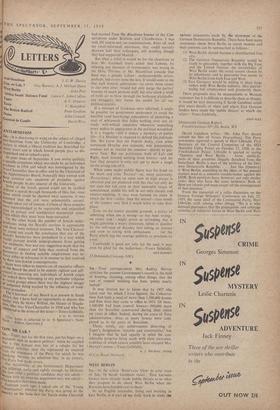SIR
' ' iiPer, not for the first time, put his finger on a Pcustulent spot in modern politics: when he recalled at a ripe tomato was less of a rebuke for his Political activities than the reprimand he received r) r°111 the organisers of the Party for which lie was .1iettking. because he admitted that, in its history, ihat Party had made errors.
The infallibility of the Government Department
but now even a political candidate may not admit— 'leaven help us, even his supporters may not admit— that tnistakes have been made. Fourteen years ago, I asked one of the 'Young Conservatives' whether his Party was going to the country on the basis that the Tories under Churchill
had learned 'from 'the disastrous lessons' of the Con- servatives under Baldwin and Chamberlain. 1 was told, Of course not; no recriminations. After all, said my (well-informed) informant, they could scarcely disavow half their colleagues, still standing though they had supported Munich.
But what a relief it would be for the electorate to hear Mr. Gaitskell freely admit that Labour, by refusing any measure of rearmament, was wrong in the Dirty Thirties; or Mr. Macmillan concede that SUez was a ghastly failure : understandable errors, perhaps, but errors none the less. It would seem to me that such historic admissions—let alone those closer to our own time—would not only purge the parties' bosoms of much perilous stuff, but also allow a whiff of fresh air to blow through the hothouse platitudin- ous smuggery that forms the model for all our political oratory.
If a measure of frankness were admitted, it might be possible for government spokesmen to avoid the horrible (and horrifying) atmosphere of plastering a coat of whitewash that hides nothing over any al- ready well-whited sepulchre whenever something nasty makes its appearance in the political woodshed. It is a tragedy—and it makes a mockery of, public life—if a Minister is required to defend' the Indefena- ible. We know that the French Army, even when convinced Dreyfus was innocent, was passionately anxious not to rescind his sentence—Merely to pre- serve 'face.' But our politicians, both of Left and Right. have learned nothing from history—and the face they preserve is only too apt to show a laugh on the wrong side of it.
When some major public figure lays his hand on his heart and cries 'Peceavi—or, more accurately, 'Pec.carimics'; when an open sore in high places is admitted and not plastered with lies that 'not only do not cure but tail even in their miserable target of concealment. public life will be not only cleaner and sweeter-smelling. It may even become an arena in which the first—rather than the second—class minds of the country may find it worth while to take their place.
Even on the lciwest possible grounds, a policy of admitting when one is wrong—or has been wrong : an easier. task ! —might prove so refreshing that it might galvanise a weary electorate, lulled to slumber by the soft-soap of decades, into taking an interest and even to voting with enthusiasm . . . for the Party which has the courage publicly to proclaim its error.
Confession is good not only for the soul; it may even be good for the ballot-box.—Yours faithfully, GUY RAMSEY 35 Downside.Crescent, NW3


































 Previous page
Previous page